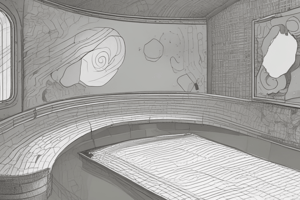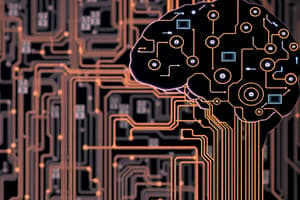Podcast
Questions and Answers
What is the primary reason for separating study and test sessions?
What is the primary reason for separating study and test sessions?
- Testing does not affect memory retention.
- Studying and testing at the same time enhances learning.
- Testing improves memory through recall. (correct)
- Separation of study and test sessions is not essential.
Which type of motivation is most closely associated with curiosity?
Which type of motivation is most closely associated with curiosity?
- Extrinsic motivation
- Internal motivation (correct)
- Operational motivation
- Passive motivation
Which type of memory is characterized by mental time travel to specific events?
Which type of memory is characterized by mental time travel to specific events?
- Procedural memory
- Episodic memory (correct)
- Iconic memory
- Semantic memory
What effect does curiosity have on memory encoding?
What effect does curiosity have on memory encoding?
Which of the following best describes semantic memory?
Which of the following best describes semantic memory?
Which area of the brain is critically involved in motivation and learning?
Which area of the brain is critically involved in motivation and learning?
In what way does internal motivation improve learning efficiency?
In what way does internal motivation improve learning efficiency?
Which example best illustrates episodic memory?
Which example best illustrates episodic memory?
What type of judgments led to better performance in the rhyming recognition test?
What type of judgments led to better performance in the rhyming recognition test?
Which type of rehearsal is more effective for long-term learning?
Which type of rehearsal is more effective for long-term learning?
How does organizing words impact recall according to Bower et al. (1969)?
How does organizing words impact recall according to Bower et al. (1969)?
What was the main conclusion of Mandler's (1967) study regarding intention to learn?
What was the main conclusion of Mandler's (1967) study regarding intention to learn?
What does deeper processing of information lead to, according to Craik & Tulving (1975)?
What does deeper processing of information lead to, according to Craik & Tulving (1975)?
What type of items tend to be chunked together for easier recall?
What type of items tend to be chunked together for easier recall?
What was the effect of presenting words in a logical hierarchical structure on memory recall?
What was the effect of presenting words in a logical hierarchical structure on memory recall?
Which statement best summarizes the relationship between level/type of processing and memory retention?
Which statement best summarizes the relationship between level/type of processing and memory retention?
What is the lag effect in relation to repeated study?
What is the lag effect in relation to repeated study?
Which training schedule led to the best learning outcomes in Baddeley and Longman's study?
Which training schedule led to the best learning outcomes in Baddeley and Longman's study?
What did Karpicke and Roediger (2008) demonstrate about the testing effect?
What did Karpicke and Roediger (2008) demonstrate about the testing effect?
What can happen when errors are made during recall training without feedback?
What can happen when errors are made during recall training without feedback?
In Karpicke & Blunt's experiment, which method contributed to the best recall a week later?
In Karpicke & Blunt's experiment, which method contributed to the best recall a week later?
What misconception did students have regarding retrieval practice?
What misconception did students have regarding retrieval practice?
According to Landauer & Bjork, what distinguishes spaced practice from massed practice?
According to Landauer & Bjork, what distinguishes spaced practice from massed practice?
What was an outcome of the spaced presentation in Kornell and Bjork's research?
What was an outcome of the spaced presentation in Kornell and Bjork's research?
What does the hierarchical model suggest about the organization of concepts in semantic memory?
What does the hierarchical model suggest about the organization of concepts in semantic memory?
How does the spreading activation model differ from the hierarchical model?
How does the spreading activation model differ from the hierarchical model?
What role do retrieval cues play in the memory retrieval process?
What role do retrieval cues play in the memory retrieval process?
What is defined as 'pattern completion' in the context of memory retrieval?
What is defined as 'pattern completion' in the context of memory retrieval?
Which factor can significantly impair the retrieval process according to the content?
Which factor can significantly impair the retrieval process according to the content?
What characterizes the activation level of a memory item?
What characterizes the activation level of a memory item?
What is a key characteristic of spreading activation?
What is a key characteristic of spreading activation?
According to Barsalou’s theories, what influences the processing of concepts?
According to Barsalou’s theories, what influences the processing of concepts?
What is proactive interference?
What is proactive interference?
In Baddeley & Hitch's 1977 study, what was concluded about forgetting?
In Baddeley & Hitch's 1977 study, what was concluded about forgetting?
Which factor is a significant influence on proactive interference?
Which factor is a significant influence on proactive interference?
What is a key characteristic of part-set cuing impairment?
What is a key characteristic of part-set cuing impairment?
What does retrieval-induced forgetting (RIF) primarily affect?
What does retrieval-induced forgetting (RIF) primarily affect?
What is the main effect observed when subjects are interrogated about stolen items from a crime scene?
What is the main effect observed when subjects are interrogated about stolen items from a crime scene?
Which statement about retroactive interference is correct?
Which statement about retroactive interference is correct?
What does RIF stand for in the context of memory retrieval?
What does RIF stand for in the context of memory retrieval?
How does the number of retrieval cues affect memory recall?
How does the number of retrieval cues affect memory recall?
Which of the following is a mechanism of interference that may lead to forgetting?
Which of the following is a mechanism of interference that may lead to forgetting?
What is a consequence of extensive training on a new list in the context of retroactive interference?
What is a consequence of extensive training on a new list in the context of retroactive interference?
How can forgetting be viewed in relation to functional behavior?
How can forgetting be viewed in relation to functional behavior?
What is one implication of selective strengthening in memory retrieval?
What is one implication of selective strengthening in memory retrieval?
What does the term 'cue overload' refer to?
What does the term 'cue overload' refer to?
Why might forgetting be considered beneficial in memory processes?
Why might forgetting be considered beneficial in memory processes?
Which example illustrates the concept of 'Tip-of-the-Tongue' phenomenon?
Which example illustrates the concept of 'Tip-of-the-Tongue' phenomenon?
Flashcards
Spacing Effect
Spacing Effect
Repeating study sessions with increasing lags between them strengthens memory.
Testing Effect
Testing Effect
Retrieval practice, or having to recall information from memory, leads to better retention than simply rereading material.
Lag Effect
Lag Effect
The benefit of repeated study sessions increases as the time between sessions increases.
Feedback in Recall
Feedback in Recall
Signup and view all the flashcards
Concept Mapping
Concept Mapping
Signup and view all the flashcards
Retrieval Practice
Retrieval Practice
Signup and view all the flashcards
Spaced Practice
Spaced Practice
Signup and view all the flashcards
Massed Practice
Massed Practice
Signup and view all the flashcards
Retrieval
Retrieval
Signup and view all the flashcards
Target Memory Trace
Target Memory Trace
Signup and view all the flashcards
Retrieval Cues
Retrieval Cues
Signup and view all the flashcards
Associations
Associations
Signup and view all the flashcards
Activation Level
Activation Level
Signup and view all the flashcards
Spreading Activation
Spreading Activation
Signup and view all the flashcards
Pattern Completion
Pattern Completion
Signup and view all the flashcards
Attention to Cues
Attention to Cues
Signup and view all the flashcards
Levels of Processing (LOP)
Levels of Processing (LOP)
Signup and view all the flashcards
Transfer Appropriate Processing (TAP)
Transfer Appropriate Processing (TAP)
Signup and view all the flashcards
Maintenance Rehearsal
Maintenance Rehearsal
Signup and view all the flashcards
Elaborative Rehearsal
Elaborative Rehearsal
Signup and view all the flashcards
Subjective Organization
Subjective Organization
Signup and view all the flashcards
Mandler (1967) - Intention to Learn Study
Mandler (1967) - Intention to Learn Study
Signup and view all the flashcards
Hierarchical Organization
Hierarchical Organization
Signup and view all the flashcards
Encoding
Encoding
Signup and view all the flashcards
Motivation & Learning
Motivation & Learning
Signup and view all the flashcards
Internal Motivation
Internal Motivation
Signup and view all the flashcards
External Motivation
External Motivation
Signup and view all the flashcards
Episodic Memory
Episodic Memory
Signup and view all the flashcards
Semantic Memory
Semantic Memory
Signup and view all the flashcards
Episodic vs Semantic
Episodic vs Semantic
Signup and view all the flashcards
Episodic vs Semantic: Debate
Episodic vs Semantic: Debate
Signup and view all the flashcards
Retroactive Interference
Retroactive Interference
Signup and view all the flashcards
Proactive Interference
Proactive Interference
Signup and view all the flashcards
Part-Set Cuing Impairment
Part-Set Cuing Impairment
Signup and view all the flashcards
Retrieval Induced Forgetting
Retrieval Induced Forgetting
Signup and view all the flashcards
Forgetting Due to Interference
Forgetting Due to Interference
Signup and view all the flashcards
Rugby Player Memory Study
Rugby Player Memory Study
Signup and view all the flashcards
Interference Impairs Memory
Interference Impairs Memory
Signup and view all the flashcards
Training and Interference
Training and Interference
Signup and view all the flashcards
Retrieval-Induced Forgetting (RIF)
Retrieval-Induced Forgetting (RIF)
Signup and view all the flashcards
Associative Blocking
Associative Blocking
Signup and view all the flashcards
Associative Unlearning
Associative Unlearning
Signup and view all the flashcards
Functional account of forgetting
Functional account of forgetting
Signup and view all the flashcards
Forgetting for flexibility and generalization
Forgetting for flexibility and generalization
Signup and view all the flashcards
Memory for intelligent decision-making
Memory for intelligent decision-making
Signup and view all the flashcards
Forgetting as a strategy
Forgetting as a strategy
Signup and view all the flashcards
Selective strengthening
Selective strengthening
Signup and view all the flashcards
Study Notes
Ebbinghaus
- Scientific study of learning and memory.
- Tested one participant (himself).
- Used nonsense syllables.
- Explored the rate of learning and forgetting.
- Found a linear relationship between learning and time spent studying.
Rate of Learning: The Total Time Hypothesis
- The amount learned is a function of the time spent learning.
- Experiment: List of 16 syllables learned daily, then relearned after 24 hours.
- Result: Learning linearly related to study time. "Practice makes perfect."
Expertise and Brain Plasticity
- Compared brain volume in taxi drivers to healthy controls.
- Taxi drivers' posterior hippocampus was consistently larger.
- Hippocampus size significantly correlated with time spent as a taxi driver.
New Learning and Brain Plasticity
- Experiment: Medical students scanned brains before, during, and after intensive exams.
- Results: Increased grey matter volume in parietal cortex and posterior hippocampus, which remained even three months later.
- Practice drives structural plasticity but isn't perpetual.
- Brain renormalizes volume in practiced regions.
Repetition
- Simple repetition without organization may not lead to learning, especially with complex information.
- Distributed practice (spacing learning trials) is faster and less forgetful.
Melton (1970): Spaced Learning of Word Stimuli Increases Subsequent Recall
- Experiment with word lists - some repeated after varying lags.
- Varying durations for presenting words.
- Results: Memory benefits despite same total study time – spacing was the key factor.
Baddeley and Longman (1978): Rate of Learning Typing
- Explored learning typing skills under different training schedules.
Kornell and Bjork (2008): Spacing and Participants' View
- Spaced presentation of artwork led to better identification of new paintings.
- Participants preferred spaced presentation over massed (dense) learning.
Karpicke and Roediger (2008): The Testing Effect/Generation Effect
- Designed a study with four groups learning Swahili-English word pairs.
- The groups differed in how they were tested.
- The presence of tests had a substantial impact on what was remembered.
- Having to retrieve information, rather than being given it, led to greater retention
Karpicke & Blunt (2011)
- Experiment on studying science texts.
- Varied study techniques: just reading, generating notes/diagrams, Testing.
- Testing led to superior recall of facts & inferential questions.
Landauer & Bjork (1978)
- Related to spaced/distributed practice and retrieval practice.
Motivation and Learning
- Motivation (e.g., curiosity) improves memory in both automatic and strategic ways.
- Curiosity and external rewards improved memorization strategies; while strategies under control were still important.
Gruber et al. (2014): Curiosity During Learning Affects Later Memory
- Curiosity during learning has a substantial effect in effective encoding, rather than just the triggering items.
Episodic Memory vs Semantic Memory
- Episodic memory = memory for specific events in time.
- Semantic memory = memory for facts (e.g., world knowledge).
- Episodic and semantic memories functionally differ.
- Neuropsychological evidence suggests different brain regions are involved, with hippocampal damage affecting episodic memory more severely.
Meaning and Schemas (Bartlett's Approach)
- Studied how complex materials are recalled (e.g., drawings, folk tales).
- Investigated recall errors, and stressed the importance of meaning in organizing learned information.
- Recalled stories were sometimes "westernized" because of preexisting knowledge.
Role of Schemas (Sulin and Dooling, 1974)
- In a study about dictators, participants had better recall when given a schema/context (e.g., context of "Adolf Hitler").
Test Sentence ("He hated the Jews...")
- Participants were more likely to incorrectly agree with a related but false assertion.
- Schematic knowledge influences memory, most especially across longer intervals.
Paivio's Dual-Coding Hypothesis
- More imageable words are more memorable.
- High vs. low imageability.
- Multiple ways of encoding a concept aids memorization.
Levels of Processing Theory (Craik & Lockhart, 1972)
- Emphasized deeper processing leads to better memory.
- Experiment with words and three different levels of processing (visual, phonological and semantic).
- Deeper processing produced better long-term recall.
Craik & Tulving (1975)
- Deep processing enhances memory.
- Demonstrated superior memory with deep processing (e.g., semantic analysis).
Morris, Bransford, and Franks (1977)
- Task: incidental learning and incidental tests.
- Participants did well only when encoding matched testing cues.
- Phonological & semantic matching.
Why is Deeper Coding Better?
- Deeper processing of information leads to more robust memory.
- Deeper coding and elaborate encoding leads to better memory.
Hierarchical Organization
- Organizing information into hierarchies improves recall.
- Bower et al., (1969) demonstrated this with word lists.
Intention to Learn (Mandler, 1967)
- Sorting by meaning (with/without knowledge of testing) produces better recall than randomly sorting.
Organization of Concepts (Lecture 3)
- Semantic memory stores knowledge about the world, and concepts are organized into hierarchical networks.
- Concepts have properties that are stored higher up in networks to minimize redundancy.
- Sentence verification tasks can be used to measure response times given hierarchical relatedness.
Spreading Activation Model
- Concepts are organized by semantic links/relatedness.
- Neural activation spreads to related concepts.
- Explains how one concept can trigger another.
- Explains how familiarity/relatedness can affect response times to sentences.
Problems with the Spreading Activation Model
- The model is too flexible (which can be a pro and a con)
- The model is difficult to test accurately.
- Still open questions about how concepts are organized within the network.
Situated Simulation Theory
- Concepts are processed in context; context/situation matters when encoding.
- Their processing is influenced by the current context/setting.
- Concepts incorporate perceptual or action-related properties.
- Concepts reflect current goals/needs.
Concepts in the Brain
- Grandmother cell hypothesis, but now considered less plausible. Now it is considered as a feature-based approach
- Different aspects of a concept (e.g., visual and motor) may be encoded in different areas.
- This new way of organizing concepts is more frequently used.
Neuropsychological Evidence (Support 2)
- Examined patients with semantic dementia (general semantic deficits).
- These patients struggled with naming objects and categorizing them.
- Also examined category-specific deficits where patients struggled more with living things than non-living things.
- These brain-based studies support the notion that concepts are organized in various ways within the brain.
Retrieval Process
- Retrieval involves progressing from retrieval cues to a memory trace.
- Target memories require activation through cues/bonds (associations).
- Strength of connections determines memory accessibility.
Factors Determining Retrieval Success
- Attention to cues: encoding context influences accuracy/fluency of retrieval.
- Cue-target associative strength: how well the cue is associated with the target memory.
- Number of cues: additional related cues improve retrieval.
Strength of Target Memory
- Strong memories are more easily retrieved, especially through associated cues.
- Frequency effect: more frequent memories activate more easily.
Retrieval Strategy
- Organization of materials at encoding aids in recall.
- Strategies/perspectives aid in retrieval of different memories previously forgotten.
Retrieval Mode
- Frame of mind/context aids in recalling stored episodic memories.
- Different retrieval situations/modes activate different brain regions.
- Involuntary retrieval occurs when something "springs to mind".
Retrieval Tasks
- Direct/Explicit Memory Tests: recalling specific experiences.
- Indirect/Implicit Memory Tests: measuring unconscious influences of experiences through priming.
Contextual Cues
- Spatio-temporal/environmental: Location and time.
- Mood: Emotional state.
- Physiological: Physical condition.
- Cognitive: Related concepts and thoughts.
Context-Dependent Memory: Environmental Factors
- Memory is better when the context of encoding and retrieval match.
- Participants recall better when their test environment matches their encoding environment.
- Similar for internal states (mood).
Mood-Dependent Memory
- Memory is better when the mood during retrieval matches the mood during encoding.
Forgettting: Rate and Curve
- Forgetting isn't always constant over time.
- Studied by Ebbinghaus and later research.
- Forgetting rate is often steep initially, plateaus or slows over time.
Availability vs Accessibility (of a memory trace)
- Availability: Does the memory exist in the memory store?
- Accessibility: Can the memory be retrieved? (depends on cues).
- Factors like better learning, more training, and repeated attempts increase memory accessibility.
Consolidation & Reconsolidation
- Memories become more permanent through consolidation which happens over time (after the encoding).
- Reminders/reactivation of consolidated memories can make them susceptible to changes, leading to a reconsolidation.
- Memories are vulnerable to forgetting in different stages of processing.
Causes of Incidental Forgetting
- Trace decay (weakening over time).
- Context shifts (new cues hinder recall).
- Interference from similar memories.
Interference
- Similar memories impair the recall of a specific memory in two ways: proactive and retroactive interference.
Retrieval Induced Forgetting (RIF)
- Selective retrieval can impair recall of similar or related memories.
- Implication for learning and studying.
- Implications for how witnesses are questioned in crime scene investigations and other circumstances.
Associative Blocking
- A cue fails to elicit a target trace due to strong competitor cues.
- Tip-of-the-tongue phenomenon is a classic example of this.
Associative Unlearning
- Associative bond between a memory trace and a cue weakens because the cue was unintentionally associated with an incorrect memory.
Functional Account of Forgetting
- Forgetting can be a positive function, as it protects against being overloaded and helps focus on similar but new contexts/memories.
Studying That Suits You
Use AI to generate personalized quizzes and flashcards to suit your learning preferences.




